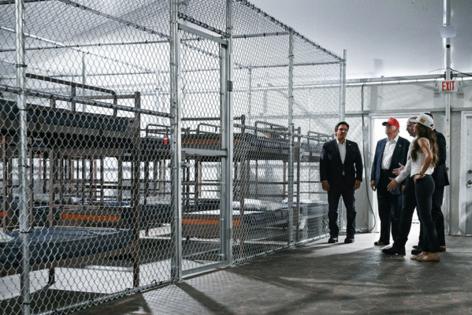Justice Department, driven by Trump policy, plans to go after naturalized U.S. citizens
Published in Political News
In his all-out war on illegal immigration, President Donald Trump has branded immigrants as “criminals,” “invaders” and “predators,” as his administration targets millions of Haitians, Latin Americans, gang members and foreign college students for deportation.
Now, the president has directed the Justice Department to bolster its resources in a major crackdown on naturalized citizens suspected of unlawfully obtaining their U.S. citizenship.
According to a recent memo, the department plans to focus not only on individuals who may have lied about a crime or having done something illegal during the naturalization process. But authorities also plan to focus on others who may have committed a crime after becoming citizens — a generally untested legal frontier.
Citing Trump’s policy objectives in the June 11 memo, the head of DOJ’s Civil Division instructed government lawyers to go after naturalized citizens who pose a potential danger to national security, such as committed acts of terrorism or espionage, violated human rights, engaged in international drug trafficking or committed felonies that were not disclosed during the naturalization application. The DOJ list of priority targets, backed by Attorney General Pam Bondi, even includes naturalized citizens who have been convicted of defrauding the U.S. government, such as Medicare, Medicaid and COVID-19 loan programs.
“These categories are intended to guide the Civil Division in prioritizing which cases to pursue; however, these categories do not limit the Civil Division from pursuing any particular case,” Assistant Attorney General Brett A. Shumate wrote in the memo, pointing to an expansive interpretation of laws on the revocation of naturalization.
A range of critics, including immigration and defense attorneys, say the Justice Department’s new “priorities for denaturalization cases” are extremely broad and vague — allowing the Trump administration to target any number of naturalized citizens for various offenses that may fall outside the scope of the law, before trying to deport them to their native country. Ultimately, a federal judge must decide on any government bid to revoke the status of a naturalized citizen, a long process involving likely appeals.
“Traditionally, the law was intended to apply to individuals who committed an unlawful act before becoming naturalized citizens — particularly if that act was not disclosed during the naturalization process or if there was a material misrepresentation on the application,” Miami immigration attorney Steven Goldstein told the Miami Herald.
“What appears to be happening now is an effort to broaden the law’s scope, targeting conduct that occurs at any point after naturalization, based on interpretations laid out in the memo,” said Goldstein, a former federal prosecutor with the now-defunct Immigration and Naturalization Service. “This administration has aggressively expanded the reach of immigration enforcement — and they’ve shown they’re unafraid to defend these expansions in court.”
The National Association of Criminal Defense Lawyers condemned the Justice Department’s new directive.
“The Trump Administration’s push to revoke citizenship is alarming, and raises serious Fourteenth Amendment concerns,” group president Christopher Wellborn said in a statement.
“Although the memo purports to target concealment of earlier offenses, the language suggests that any offense, at any time, may be used to justify denaturalization,” he said. “This is particularly concerning given the administration’s reliance on vague claims of gang affiliation in deportations.”
The impact of the new DOJ policy aimed at U.S. citizens who were born in a foreign country is unclear. According to the Migration Policy Institute, a Washington, D.C., think tank, the United States has about 24.5 million naturalized citizens, a little more than half of the country’s immigrant population.
Historically, the Justice Department has zeroed in on Nazi collaborators, Communist party members and spies for denaturalization if they “illegally procured” their U.S. citizenship, including “by concealment of a material act or by willful misrepresentation,” according to federal law. Denaturalization was commonly used during the McCarthy era of the late 1940s and early 1950s, and expanded during the Obama administration and Trump’s first term in office.
The country’s latest denaturalization case occurred in mid-June when a federal judge revoked the citizenship of Elliott Duke, an American military veteran from the U.K. who was convicted a decade ago of receiving and possessing child-porn images while stationed in Germany — a crime he did not disclose on his naturalization application before becoming a U.S. citizen in 2013.
Trump and Mamdani
The issue became even more heated after the Trump administration raised the possibility of stripping Zohran Mamdani, the Democratic mayoral candidate for New York City, of his U.S. citizenship as part of the crackdown against foreign-born citizens convicted of certain offenses. The spurious allegation, known to be false, is that Mamdani may have concealed his support for “terrorism” during the naturalization process.
Mamdani, 33, who calls himself a Democratic socialist, was born in Uganda to ethnic Indian parents, became a U.S. citizen in 2018 and has attracted widespread media attention over his vocal support for Palestinian rights.
Trump, during a visit last week to the new Everglades detention facility called Alligator Alcatraz, was asked about Mamdani’s pledge to “stop masked” Immigration and Customs Enforcement agents “from deporting our neighbors.”
Trump responded: “Well, then, we’ll have to arrest him.”
Mamdani posted a statement on X: “The President of the United States just threatened to have me arrested, stripped of my citizenship, put in a detention camp and deported. Not because I have broken any law but because I will refuse to let ICE terrorize our city.”
Miami test case
Longtime North Miami immigration attorney Andre Pierre, who toiled for years on a landmark denaturalization case, said he has seen both Democratic and Republican administrations pursue aggressive immigration policies — but no president has made the issue as controversial and visible as Trump.
Pierre said Trump ran for reelection on the campaign promise of ridding the country of illegal immigrants who have been convicted of committing crimes, along with gang members from El Salvador and Venezuela. But as soon as he was sworn in as president for a second term, he said, Trump started going after everyday, working-class Venezuelans, Haitians, Cubans and other immigrants with temporary protected status or humanitarian parole.
“A lot of people in these communities voted for for him and didn’t think he was going to go that far,” Pierre told the Herald.
Pierre said it was only a matter of time before the Trump administration would zero in on naturalized foreign-born citizens in the United States. But after reviewing the Justice Department’s list of priorities for denaturalization cases, he came away dismayed.
“This memo is shocking,” Pierre said. “But I don’t see a lot of evidence supporting the kind of cases they want to go after.”
Decades ago, Pierre represented a Haitian restaurant owner in Miami who applied for naturalization in November 1994, was approved in February 1996 and took the oath of allegiance and became a naturalized citizen in April 1996. But that fall, Lionel Jean-Baptiste was arrested on cocaine distribution charges, convicted at trial and sentenced to eight years in prison.
Evidence showed that Jean-Baptiste committed the crime in March 1995 while his application for naturalization was still awaiting approval by the U.S. government — a fact that would ultimately undo his citizenship.
After his conviction, government lawyers moved to revoke his naturalization status in what was considered to be a “test” case, claiming he illegally procured his citizenship because he failed to show “good moral character” during the application process. A federal trial judge agreed — a decision affirmed in 2005 by a federal appeals court in Atlanta.
The key issue was whether the mere allegation of criminal activity against the Haitian immigrant demonstrated a lack of good moral character, a requirement for naturalization.
“The case dragged on for years,” Pierre said. “It went all the way up to the Supreme Court.”
After Jean-Baptiste, 77, lost his naturalization status, Immigration and Customs Enforcement was then able to take the next step of deporting him to Haiti.
U.S. v. Fedorenko
The Justice Department’s new memo on denaturalization policies suggests that government lawyers might be able to pick ripe cases and expedite naturalized citizens as part of the Trump administration’s aggressive goal of deporting millions of illegal immigrants.
But a historic South Florida case that lasted for years suggests otherwise, because of the extraordinary due process afforded the defendant: Feodor Fedorenko, a former guard at the infamous Treblinka death camp in Poland, where the Nazis killed about 900,000 Jews during the Holocaust.
When the Ukrainian-born Fedorenko applied for a visa to enter the United States in 1949, he lied about his activities during the war. He was granted a visa and lived in the U.S. under the radar for about 20 years. He then applied for U.S. citizenship and once again lied about his activities during the war and failed to disclose his collaboration with the Nazis in carrying out war crimes. He became a naturalized U.S. citizen and continued with his life working at a factory in Connecticut — until his retirement in Miami Beach.
Authorities caught up with him. In 1978, federal prosecutors moved to strip Fedorenko of citizenship at trial before U.S. District Judge Norman Roettger in Fort Lauderdale.
Fedorenko’s case, which was cited several times in the Jean-Baptiste ruling by the appeals court, featured dramatic testimony by a half-dozen Jewish survivors of Treblinka who were living in Israel, by Fedorenko himself and by character witnesses.
When asked about the gas chambers at the camp, Fedorenko testified that he never went near them, though he could see them from the guard tower where he was stationed occasionally, according to 2014 book, “Forgotten Trials of the Holocaust.” Fedorenko, who considered himself a “prisoner of war” even though he worked as a private in the German army, acknowledged that the Germans gave him a gun. But he denied that he ever whipped or shot an inmate.
The lead Justice Department lawyer, Jon Sale, who had been an assistant special Watergate prosecutor, was tasked with proving by “clear and convincing” evidence that Fedorenko illegally procured his citizenship by hiding his past as a Nazi guard from U.S. immigration authorities.
But in the end, Roettger rejected the testimony of the Treblinka survivors and spared Fedorenko from being denaturalized. Although Roettger was not entirely convinced of Fedorenko’s “do no evil” depiction of himself as a Treblinka guard, the judge never took the next step of finding that his denial of what witnesses said about him was also untrue.
Sale’s team appealed, and the judge’s ruling was overturned in 1979. Two years later, the U.S. Supreme Court upheld that ruling, leading to the former Nazi guard’s denaturalization.
“Even then, his due process rights continued to be honored when the Immigration and Naturalization Service afforded him administrative hearings and appeals,” Sale, a prominent defense lawyer in Miami, told the Herald. “After all this due process, he was finally deported to the Soviet Union.”
There, because of his commission of war crimes in Crimea, Fedorenko, 79, was tried, found guilty and executed in 1987, a year after his deportation.
_____
©2025 Miami Herald. Visit miamiherald.com. Distributed by Tribune Content Agency, LLC.




























































Comments